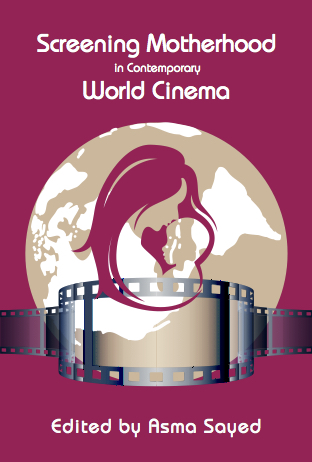
Price: $39.95
Page Count: 436
Publication Date: February 2016
ISBN: 978-1-926452-49-4
From Canada to Iran, from Germany to Argentina, from science fiction to animation, from experimental to mainstream, Screening Motherhood in Contemporary World Cinema brings the representation of motherhood and mothering on screen to the forefront. Sketching out an ambitious argument about the ability of the popular to promote serious subversion of the mainstream, it parses ways in which the mother-daughter duo can break a patriarchal stranglehold. This book brings welcome critical scrutiny to a range of films and concerns not widely circulated and, in so doing, opens a conversation calling for responses and examples from other quarters. A valuable addition for all concerned with film, gender and women’s studies.
—Gail Vanstone is an associate professor at York University, Toronto and the author of D is for Daring
Screening Motherhood in Contemporary World Cinema captures the maternal on film and in women’s lives by offering critical reflections on cross-cultural representations and realities of motherhood. Are representations of mothers coloured by race, connected to nation, or situated in class terms? Are images of weak, submissive, and sacrificial mothers still predominant in cinema from around the world? From Brave and Harry Potter to Mercedes Mirabal and Bollywood, case studies from North to Latin America, and unlike other examinations of motherhood in cinema, Screening Motherhood takes a global view, covering explorations of mothers in multiple cinematic traditions. This collection extends the conversations taking place in world cinema, feminist film studies, and mothering scholarship by shining a spotlight on maternal representation in film globally. The chapters take film as a cultural document, exposing how mothers on the big and small screen re-inscribe “intensive mother” norms but also disrupt the discourse. Asma Sayed illustrates how on/off screen the lives of mothers cross-culturally are complex, dynamic, and open to change. Scholars and film lovers will be eager to engage with the text and the possibilities Screening Motherhood opens up for women, especially mothers, to participate in telling their own stories.
—Joanne Minaker, Associate Professor, MacEwan University, Edmonton
Acknowledgments
Intersectional Interventions in Global Cinema: Introducing the Maternal
Asma Sayed
PART I: Mothers Resisting from the Margins
1. Obāchan’s Garden: Maternal Genealogies as Resistance in Canadian Experimental Documentary
Sheena Wilson
2. “Every child is a mother’s blessing”: Mothers and Children in Ana Kokkinos’ Blessed.
Veronica Thompson
3. Discourses of the Maternal in the Cinema of Eastern Europe
Irene Sywenky
4. (Re)producing Globalization: The Labouring Maternal Body in Maria Full of Grace
Jennifer Wingard
5. Don’t Slap Yo’ Momma: Tyler Perry and Madea
Kwakiutl L. Dreher
6. Disrupting and Containing Motherhood: Challenging Subversive Representations in Waitress and Frozen River
Rachel D. Davidson
7. Mother as Failed Communist Muttirepublik in Wolfgang Becker’s Good Bye Lenin!
Susan Wansink
8. ‘Mother-subjects’in Canadian Film: Off-focus or Off-screen?
Terri Hawkes
PART II: Popular (Mis)conceptions of Mother
9. Fortune Favours the Brave: Brenda Chapman’s Attempt to Tell a Mother-Daughter Story of Conflict and Love in a Fairy Tale Film
Linda Pershing, Amanda Lenox, and Melissa Martinez
10. Demeter/Kali Rising: The Fierce Mother in Harry Potter
S. Hilary Anne Ivory
11. Alien versus Terminator: Representations of Motherhood in Science Fiction
Rachael Johnstone
PART III: Screening Latin Mamas
12. Mamá de las Mariposas: Cinematic Portrayals of Mercedes Mirabal and Reclaiming Maternal History
Tegan Zimmerman
13. Motherhood and Identity in Contemporary Argentine Cinema
Fernando Gabriel Pagnoni Berns
14. Maligned Mothers: From Coatlicue to La Malinche and Back
Cristina Santos
PART IV: Eastern Mothers
15. Motherhood and Masculinity in Atiq Rahimi’s Syngue Sabour
Elli Dehnavi
16. Indian Cine-‘maa’: A Body of Patriarchal Discourse
Ramita Jhamtani
17. The ‘New’ Indian Mothers in Popular Bollywood Films
Asma Ayob
18. The Aesthetics of Dis/Empowered Motherhood in Iranian Cinema (1965-1978)
Khatereh Sheibani
Contributors
For
Zohra, My Mother
Tehzeeb, Amber, Irshad, My Children
Acknowledgements
First, my warm thanks to all the contributing authors whose expertise has made this volume such a rich resource on maternal issues in world cinema. I would especially like to thank Andrea O’Reilly and her team at the Demeter Press for supporting this project and being available to guide me through the editing and production processes. Thank you to Naheed Jafri, my research assistant, whose intellectual labour and skills were very helpful. Finally, to my family, my husband and my children: thank you for your consistent encouragement, understanding, patience and love.
Asma Sayed
2015
Asma Sayed, PhD, researches Canadian literature in the context of global multiculturalism. Her current research focuses on Islamophobia and the image of Muslim women in popular culture, particularly in Indian cinema. She teaches women’s and gender studies, cultural studies, communication studies and comparative literature at a number of western Canadian universities. Her recent edited works include M. G. Vassanji: Essays on His Works (2014), Writing Diaspora: Transnational Memories, Identities and Cultures (2014), and World on a Maple Leaf: a Treasury of Cana- dian Multicultural Folktales (2011).


